At the time of writing, it is Chinese New Year. The Year of the Dragon has just passed, which was my "animal year". This dates me, because my age is therefore a multiple of twelve! Yes, I am 72.
One's animal year is, it is said, a time of particular significance, in which one is particularly vulnerable. It is sometimes seen as a critical time, potentially for both good and ill. My dear wife even sewed a little scarlet ribbon on the inside of my belt, to act as a degree of protection. It is now, in the Year of the Snake, her own animal year, and she likewise wears a red-amber bangle, which was a personal possession of her own Laolao.
Looking back on my animal year, it does indeed seem that it was a year of tremendous significance for the course of our family - a year in which much was decided, and which will probably be seen as the "turning point" in our family direction. I would not like to "count my chickens before they hatch", but events were put in motion that could very well lead to a (really very welcome) degree of certainty in our family situation. I look forward to the possibility of explaining more at some point in the future.
Academic lives are filled with uncertainty, given the short-term nature of most non-tenured research contracts - perhaps this is true of everyone, but I see the definite personal effects of this in my own life. Lei and I are both in the same discipline, and in fact work for the same senior professor. You may have noticed, even over the course of the years on this humble web-site, how often I move from college to college within my university, often not staying in one place for more than a year or two, and this is due to the transient nature of academic posts for younger researchers.
I am reminded of Kongzi / Confucius' words that a man must be established by the time he is thirty. I suspect that the great sage may not have been referring to the life of Western academics. Being established by the age of thirty would be considered an extraordinary feat, certainly in England.
So, it is with something of a sigh of relief that I bring all of this to today's tea-session, in which we encounter a pair of Douji samples from the generous shelves of Jerry Ma, the owner of China Chadao.
I casually browse my notes on the 2010 Douji Yiwu. It seems that I didn't enjoy it very much. As chance would have it, I appear to have closed the article by writing "My hopes will remain high for the 2011 Douji Yiwu."
Here we are, some years later, sitting down with this particular tea.
This is a tea which, as with most Douji cakes, looks very pleasant when dry. Although the leaves are fragmented, they are healthily shiny, and the hairs on each leaf are obvious.
It is a tea that takes three or four infusions to reach the state pictured above; before that, it is a watery, nondescript pale yellow. Likewise in character, it takes some time to become full-bodied and sweet, as it eventually becomes. This is not at all bad.
The genre of the tea is "wet straw" Yiwu, which is one of my favourites. For me, the epitome of this genre is my beloved, and humble, 2006 Xingshunxiang. The Douji variety is quite dense in its sweetness, after the fourth infusion, but it has the explicit addition of Douji "blackness" that dwells in its base, and becomes particularly obvious in the aftertaste. This must be a consequence of production because, as with modern Xiaguan cakes, Douji appear to be able to impart the characteristic to leaves from almost any area. I don't know that it is particularly welcome in an Yiwu tea.
Ultimately, it is better than my memory of the citric 2010, but it is, in the end, an unexalted and straightforward Yiwu. While not for sale at China Chadao, I can imagine that the Douji-mandated price would be quite high, and the tea surely cannot live up to such a price.
Given that Douji is a brand of the Yiwu Zhengshan Tea Company, I would imagine that they would have Yiwu cakes "down" by now, and that each year would be an improvement in quality. However, the 2010 and 2011 Yiwu cakes were certainly rather flat, to my tastes, and I am left wondering what has changed with Douji.
This next tea is available - it comes as a xiaobing of 200g, and currently costs $80. As with the Yiwu, the leaves are larger fragments but look healthy. Perhaps due to the cold winter climate, the tea is asleep, and has very little in the way of aroma.
Regular readers may recall my appreciation for, among other things, an old-fashioned pu'ercha. This blend of leaves from the "six famous tea mountains" in Xishuangbanna is definitely in that genre, and I feel right at home.
While the blend is broad, and therefore does not taste of any particular mountain, it is decidedly "Banna". This is a point in its favour, and my mind recalls the series of 'Banna cakes from young to old that I have been fortunate enough to encounter. They have the potential to age very well, being the "original" pu'ercha.
This is a (very) strong blend. It is also extremely straightforward: the character of cup 1, infusion 1 is precisely the same as all future cups. It does not suffer from the thin texture of the Yiwu, and has a more solid body. This combines with a fresh cooling sensation that leaves the breath minty after just two cups. It is ultra-orthodox, and, unusually for Douji, has little of the "house style" to it.
It could well be that, if I lived in a hot and humid country, I would favour a strong, old-style cake like this for immediate storage. However, its price is really very high - $80 for a half-weight cake is a significant outlay for a cake that is so straightforward. The quality of the leaves is very good, as evinced by the cooling sensation and their longevity, but... that price is something of an obstacle. A good tea, in itself, but the Douji-mandated price may be too high.
Shown together, with the 2007 cake on the left, and the 2011 Yiwu on the right, one can see the difference in ages from the colour of the leaves, and also the more heterogenous nature of the 2007's blend.
I'm still waiting for Douji to retain the charming heights that they scaled with some of their 2006 cakes. One shouldn't give up hope.

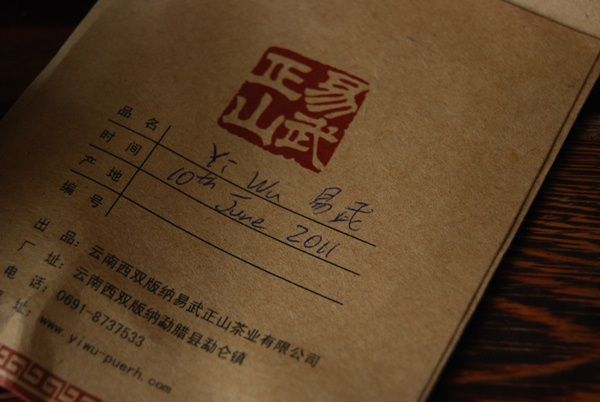
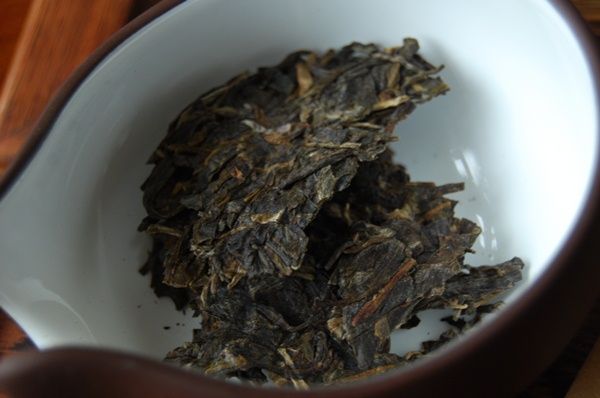
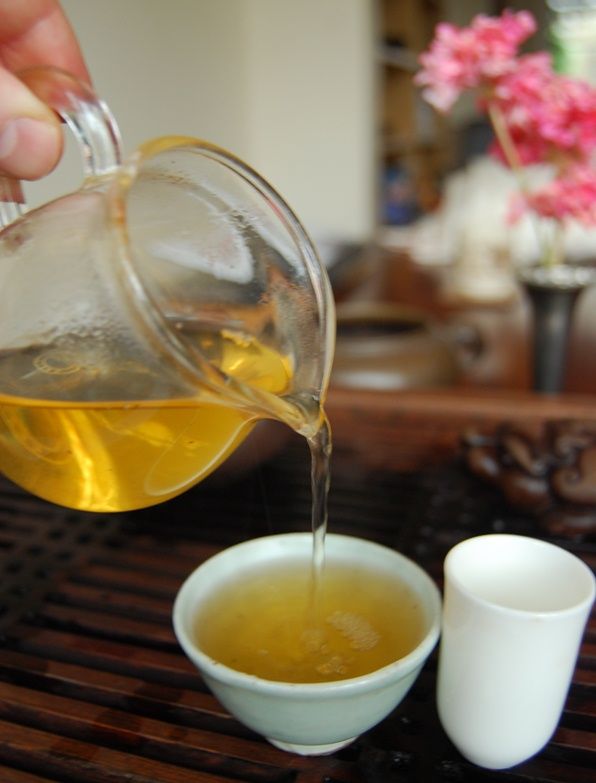
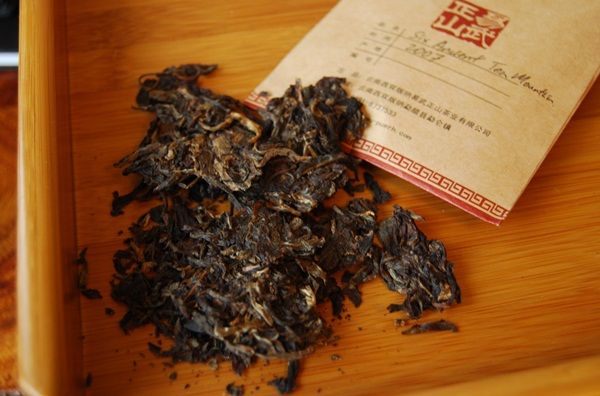
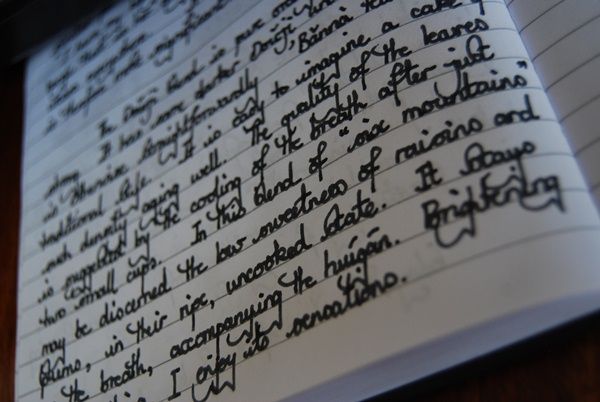
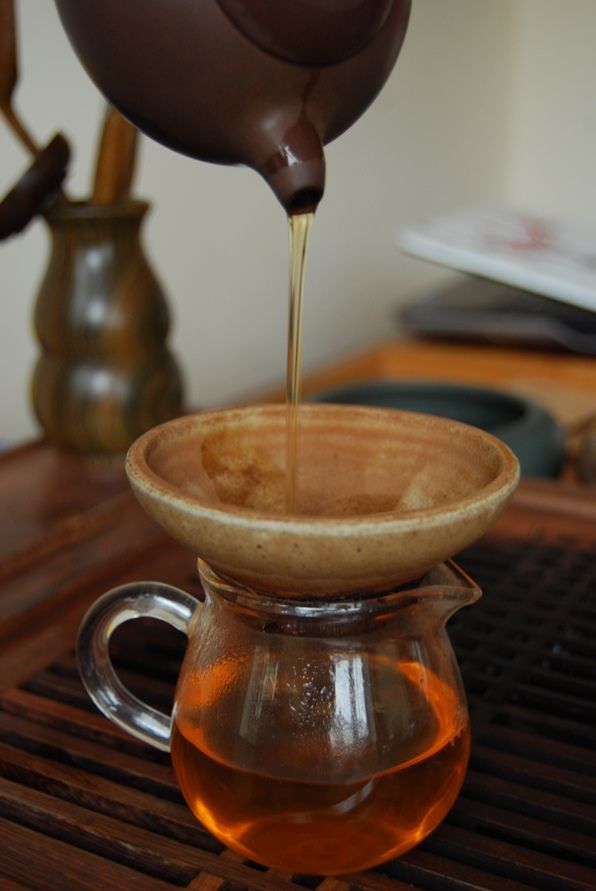
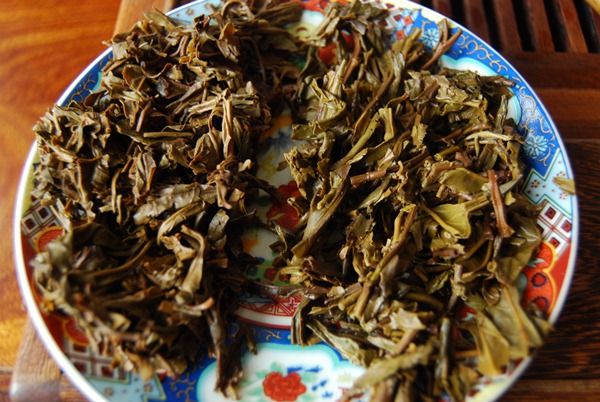
4 comments:
I guess that since Yiwu is more and more hyped and (probably) overharvested, it seems to me that even "mid-priced" Yiwu tends to get bad.
I almost gave up hoping that Douji would create something noteworthy post-2006...
Jakub
I'm a bit more positive towards Douji, I suspect, but they do seem to be very expensive.
The blends, in particular, are really rather enjoyable - I have a soft-spot for such things after years of drinking Dayi. :)
Toodlepip,
Hobbes
A ribbon inside the belt - what a great idea. Kathy has been telling me that I need to buy some red underwear for this year. I haven't quite gotten around to that yet!
Dear Nada,
Don't let my suggestions interfere with the purchase of scarlet pants. :)
Toodlepip,
Hobbes
Post a Comment